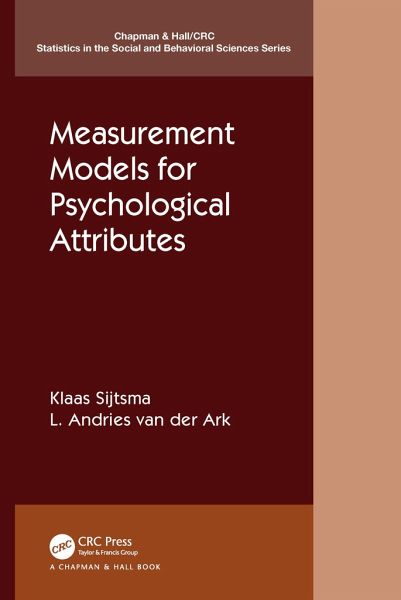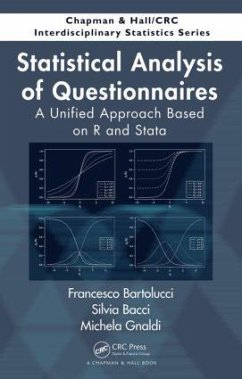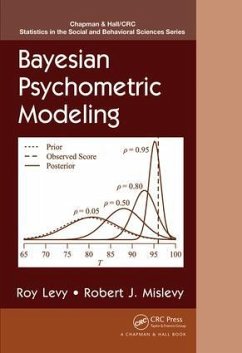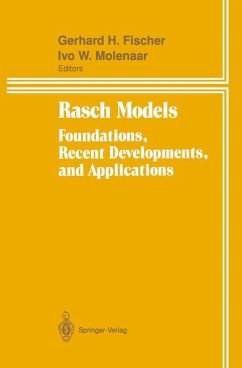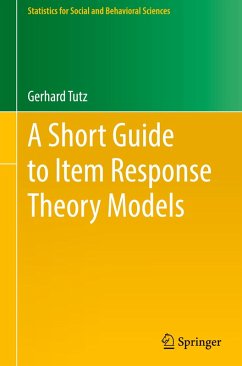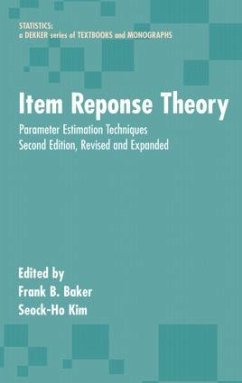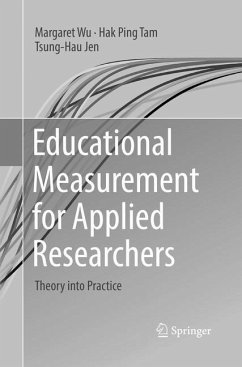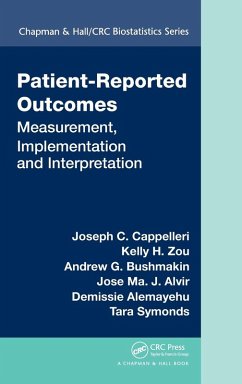Measurement Models for Psychological Attributes
Versandkostenfrei!
Versandfertig in 1-2 Wochen
Weitere Ausgaben:

PAYBACK Punkte
105 °P sammeln!





A comprehensive and accessible treatment of the common and the less than common measurement models for the social, behavioral, and health sciences.
Klaas Sijtsma is a professor of Methods of Psychological Research at the Tilburg School of Social and Behavioral Sciences, Tilburg University, the Netherlands. His research specializes in psychometrics, in particular, all issues related to the measurement of psychological attributes by means of tests and questionnaires. He is a past President of the Psychometric Society, editorial board member for several journals, and has authored two other books on measurement. Andries L. van der Ark is professor of Psychometrics at the Research Institute of Child Development and Education, Faculty of Social and Behavioural Sciences, University of Amsterdam, the Netherlands. His primary research interests include reliability analysis, nonparametric item response theory, and categorical data analysis. The authors have published over 40 papers together on measurement in the social and behavioral sciences.
Produktdetails
- Verlag: Chapman and Hall/CRC
- Seitenzahl: 430
- Erscheinungstermin: 23. Oktober 2020
- Englisch
- Abmessung: 240mm x 161mm x 28mm
- Gewicht: 807g
- ISBN-13: 9781439881347
- ISBN-10: 1439881340
- Artikelnr.: 59983087
Herstellerkennzeichnung
Libri GmbH
Europaallee 1
36244 Bad Hersfeld
gpsr@libri.de
"There are very few measurement textbooks that are accompanied with such a strong quantitative foundation, and those that are tend to be quite dated. This book is thus unique in providing a contemporary measurement text that is also designed for students that have a good quantitative background (as might be provided by a good introductory statistics course). Another very appealing feature of this book is its extensive coverage of various models and methodological tools that can be applied in the context of measurement. Network models and diagnostic models, for example, are relatively recent innovations in measurement. Having a single book covering all these techniques gives readers an appreciation for the different ways in which measurement
Mehr anzeigen
can be considered from a quantitative perspective. The book would thus be an excellent choice for a graduate-level or advanced undergraduate-level measurement course. But the book would also function well as a reference text given the variety of topics covered." ~Daniel Bolt, University of Wisconsin, Madison
"I read the chapters with great interest. I think that a book like this is certainly useful as similar books are either too technical, too conceptual, or too narrow focused. In the chapters I read, the authors found a nice balance between technical and conceptual detail. This makes the book useful as both a textbook to be used for master students and as a reference book for (applied) researchers. I especially liked the boxes with derivations."
~Dylan Molenaar, University of Amsterdam
"I think many people could find this book useful. You could think of researchers in the social and behavorial sciences, Phd students, research master students and peer psychometricians. The additional value of this book is that it goes just beyond the basics of psychometrics. People may both use it as a reference and a textbook."
~Samantha Bouwmeester, Erasmus University Rotterdam
"It was a joy to read chapter 4. It was well written and interesting to persons who start with IRT and persons who worked with it for years. It explains the principles very well, as well has an eye for interesting subtleties."
~Bas Hemker, CITO
"This chapter 3 would be useful for statisticians, epidemiologists, psychometricians, methodologists, and mathematical psychologists who are working with social scientists or behavioral scientists, or in health care research or in educational research. It would also be useful for graduate students in the fields of statistics, epidemiology, etc. I would say that knowledge of statistics at an intermediate level is required."
~J.L. Ellis, Behavioural Science Institute, Radboud University
"I read the chapters with great interest. I think that a book like this is certainly useful as similar books are either too technical, too conceptual, or too narrow focused. In the chapters I read, the authors found a nice balance between technical and conceptual detail. This makes the book useful as both a textbook to be used for master students and as a reference book for (applied) researchers. I especially liked the boxes with derivations."
~Dylan Molenaar, University of Amsterdam
"I think many people could find this book useful. You could think of researchers in the social and behavorial sciences, Phd students, research master students and peer psychometricians. The additional value of this book is that it goes just beyond the basics of psychometrics. People may both use it as a reference and a textbook."
~Samantha Bouwmeester, Erasmus University Rotterdam
"It was a joy to read chapter 4. It was well written and interesting to persons who start with IRT and persons who worked with it for years. It explains the principles very well, as well has an eye for interesting subtleties."
~Bas Hemker, CITO
"This chapter 3 would be useful for statisticians, epidemiologists, psychometricians, methodologists, and mathematical psychologists who are working with social scientists or behavioral scientists, or in health care research or in educational research. It would also be useful for graduate students in the fields of statistics, epidemiology, etc. I would say that knowledge of statistics at an intermediate level is required."
~J.L. Ellis, Behavioural Science Institute, Radboud University
Schließen
Für dieses Produkt wurde noch keine Bewertung abgegeben. Wir würden uns sehr freuen, wenn du die erste Bewertung schreibst!
Eine Bewertung schreiben
Eine Bewertung schreiben
Andere Kunden interessierten sich für




